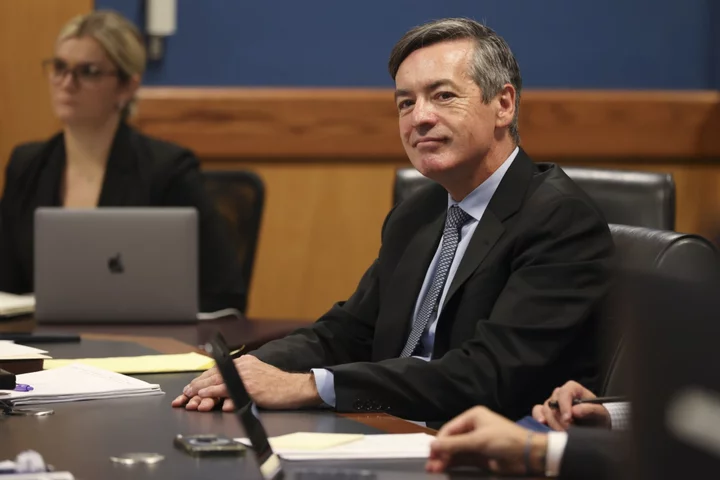Prosecutors pursuing Donald Trump on Georgia racketeering charges secured a crucial guilty plea and cooperation agreement from Kenneth Chesebro, an attorney who may directly tie the former president to efforts to overturn the 2020 election by empaneling alternate slates of electors.
Chesebro on Friday became the third of the 19 defendants to plead guilty. But his courtroom admissions were the most detailed yet about Trump’s actions after losing the 2020 election. With his plea, Chesebro can provide an inside account to Fulton County District Attorney Fani Willis about the plot to recruit electors to falsely certify Trump as the winner in several states that President Joe Biden had won, including Georgia.
The plea also means Willis and Chesebro will avoid a five-month trial that was supposed to start on Monday. Instead, prosecutors can focus now on other defendants who may also choose to cooperate. Willis also won’t risk having to reveal some of the evidence her office has collected during a three-year investigation.
“This is extremely bad news for Donald Trump,” said Gene Rossi, a former federal prosecutor. “What better person to describe why the fake electors scheme was a complete fraud than the person who authored it? He may have information on meetings in which President Trump was informed that the scheme was a complete fraud. That’s devastating.”
A Harvard Law School graduate and prominent appellate lawyer, Chesebro entered his plea in the downtown Atlanta courthouse shortly after the jury selection process began for the racketeering trial against him. His admission followed Thursday’s guilty plea by Sidney Powell, a prominent right-wing lawyer who was set to stand trial with Chesebro this month.
Chesebro, 62, pleaded guilty to one felony count of conspiracy to file false documents, with prosecutors dismissing racketeering and other charges against him. He has already begun to debrief Willis’s prosecutors and had written an apology letter to the citizens of Georgia, as part of the terms of his plea deal, lawyers said in court.
The pair of guilty pleas this week mean not only that the first trial is off, but also that two key figures in Trump’s orbit in the months following the 2020 election are poised to cooperate with prosecutors and perhaps testify against him in a future trial. Both also avoided the most serious charge of racketeering, which carries a prison term of as many as 20 years.
Trump has pleaded not guilty and vows to fight the case. Trump has repeatedly belittled and mocked Willis during her investigation. The plea is a significant victory for Willis, an elected Democrat who has pursued Trump for nearly three years, and a setback for the former president, who faces four criminal indictments in state and federal courts.
Trump’s lead attorney in Georgia, Steve Sadow, said the Chesebro plea was the apparent result of “pressure by Fani Willis and her team and the prosecution’s looming threat of prison time.”
A person familiar with the situation said that advisers to Trump weren’t concerned about Chesebro’s guilty plea because information about the attorney’s postelection activities was already largely public and they believed it was helpful to Trump’s case.
A spokesperson for Trump’s 2024 presidential campaign didn’t immediately respond to requests for comment.
Pressure on others
The plea will presumably increase the pressure on other Trump insiders to plead guilty to avoid the hammer of a possible racketeering conviction. Fulton County Superior Court Judge Scott McAfee hasn’t set trial dates yet for Trump and the other remaining 15 defendants, who include former New York City Mayor Rudy Giuliani, former White House chief of staff Mark Meadows, and former senior US Justice Department official Jeffrey Clark.
Under the deal, Chesebro must serve five years probation, pay $5,000 in restitution, and complete 100 hours of community service. Due to Georgia’s first-time offender law, he’ll be eligible to have the charge cleared from his record once he completes his sentence.
Read More: Ex-Trump Ally Powell Pleads Guilty, Set to Cooperate Against Him
Chesebro admitted that he conspired with Trump, Giuliani, attorney John Eastman and others in the electors scheme. One goal of the conspiracy, prosecutors said, was to use those fake certifications to convince members of Congress — and, ultimately, then-Vice President Mike Pence — to delay making Biden’s victory official or to overturn the vote tallies altogether.
Chesebro fought the Georgia case up until the eve of his guilty plea, arguing he did nothing illegal in advancing legal theories in supporting Trump. But McAfee refused to dismiss the charges, setting up a trial expected to last five months.
Chesebro and Powell had moved for “speedy” trials under Georgia law, expediting the time frame for prosecutors to get their case ready for a jury and to hammer out any plea negotiations.
Beside Chesebro and Powell, Georgia bail bondsman Scott Hall has also pleaded guilty.
Chesebro and Powell are also unindicted co-conspirators in the federal indictment of Trump over his efforts to overturn the election. It’s unclear if the plea deals in Georgia mean they’ll cut deals or agree to cooperate with federal prosecutors under US Justice Department Special Counsel Jack Smith.
(Updates with attorney’s comment on guilty plea.)

